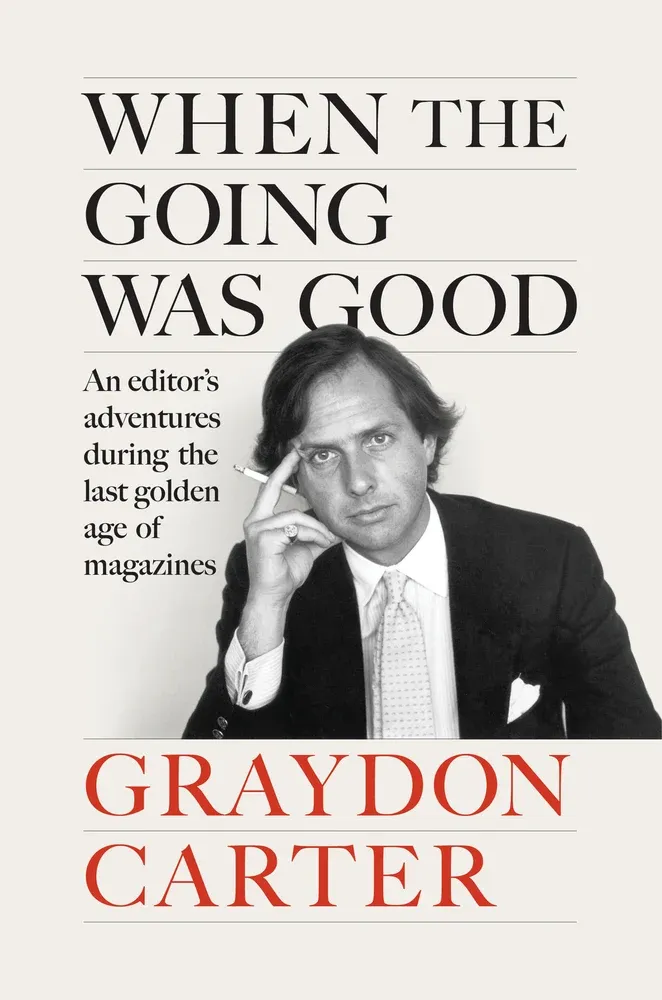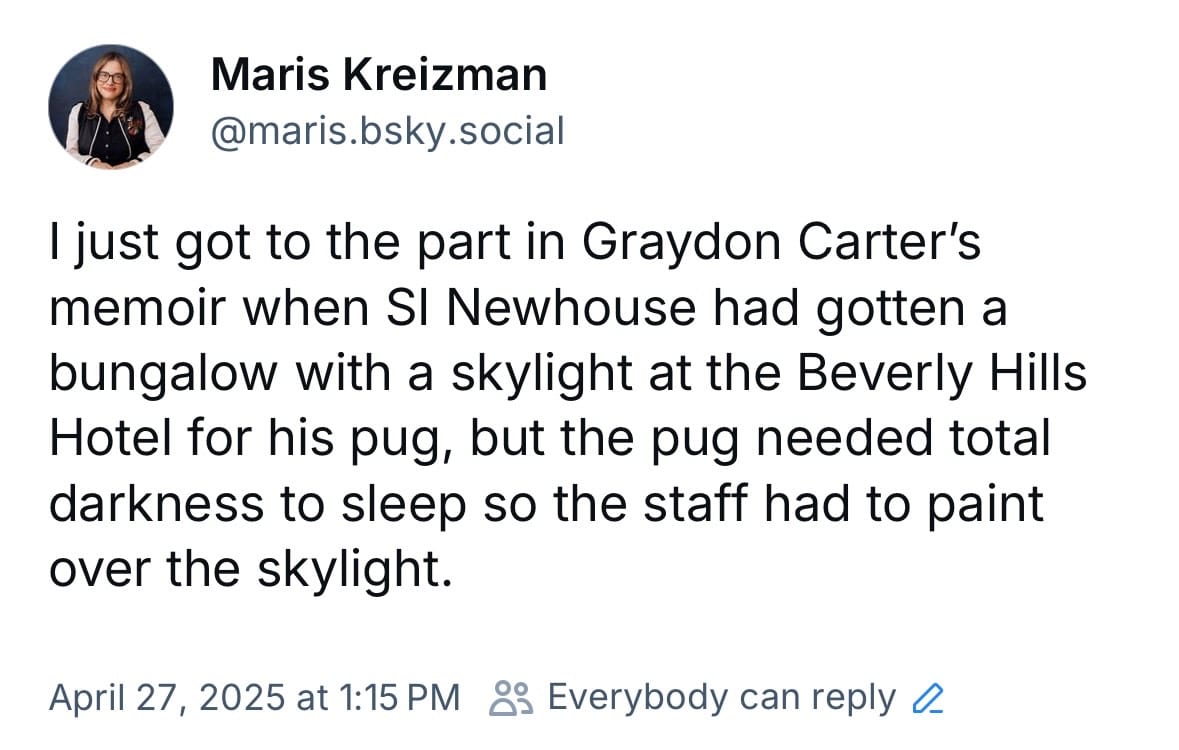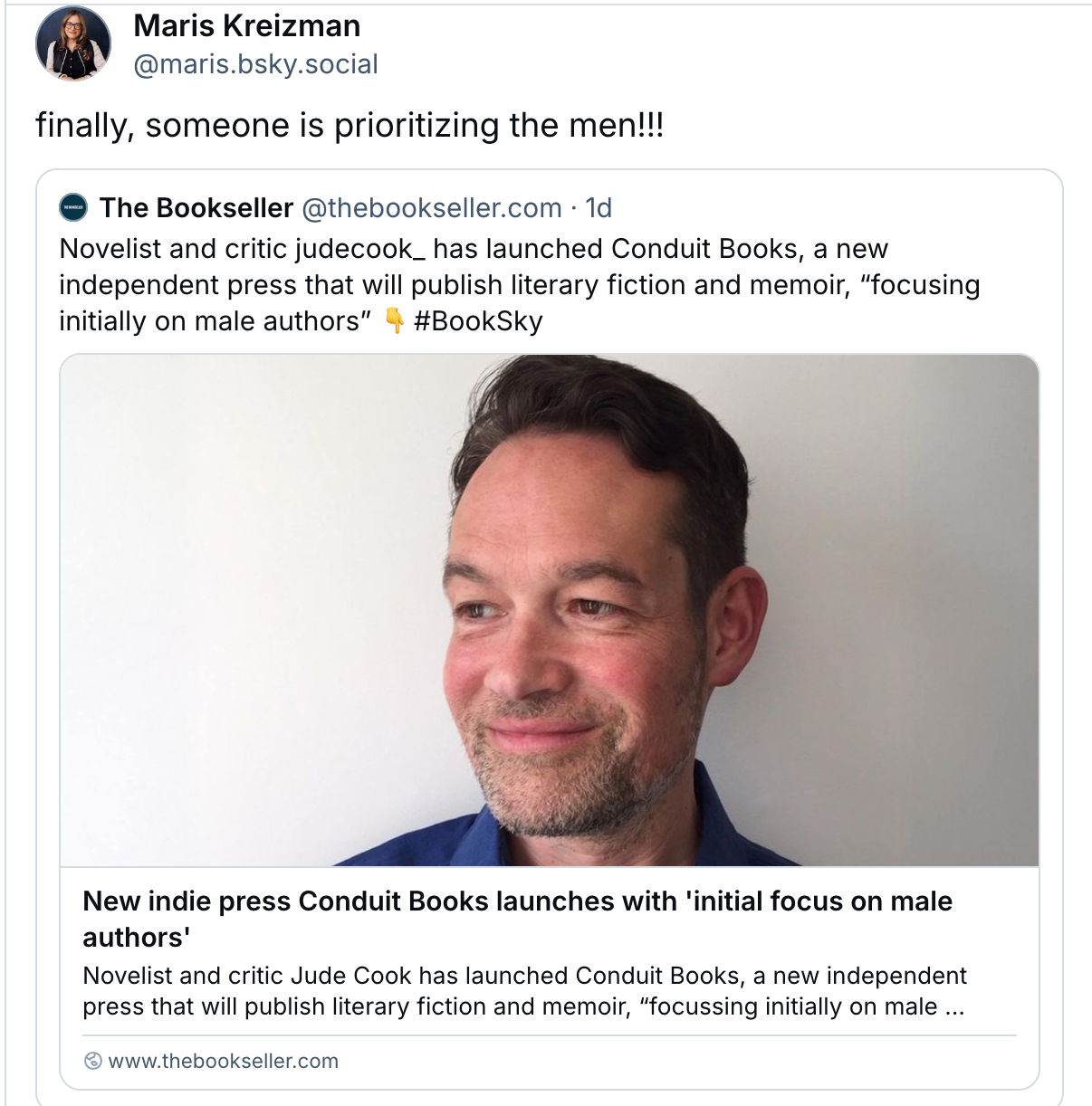The Maris Review, vol 52
This week I go into how Perfection is the polar opposite of The Anthropologists, plus my favorite details from Graydon Carter's new memoir...
What I read this week

Perfection by Vincenzo Latronico, translated by Sophie Hughes
It's fitting that Perfection has a glowing blurb from Ayşegül Savaş because I feel like it's the perfect polar opposite to her life-affirming most recent novel, The Anthropologists. Savaş's novel follows an expat couple living in a new unnamed city and trying to build a life for themselves but with hope and curiosity about others, and Latronico's novel follows an expat couple living in a new city (Berlin) and trying to build a life for themselves, but in this version they're primarily consumers and Instagram filter users. Come to Perfection if you're looking for the more nihilistic version of What Life Is Like for Millennials (this is not an insult).
Perfection follows Anna and Tom, who were born in the early 1980s and who both knew they didn't want to end up in boring jobs in boring neighborhoods in their unnamed home country. Anna and Tom don't have individual dialog, everything they do in the novel (except at the very end) is as a unit. They run their graphic design and digital marketing businesses together, they do the cooking together, they prove ineffective at actually helping the charity for which they've volunteered with good intentions, they go to art openings and wait in line to get into Berghain and do cocaine together, they contemplate the prices of Berlin apartments and watch as rents skyrocket, and as always, they scroll through their various social feeds in tandem.
Latronico implicates his readers – at least the ones who are middle aged and thought they'd like to go into an artistic field – in a way that feels novel. I found myself thinking, "oops, that's me" and "that's also me," (not the cocaine) at various points, and from that sense of unease he let's us be the ones who then become judgmental about his characters' decisions. It's one of those books that captures a particular moment in history in a way that feels entirely obvious and yet unchartered.

When the Going Was Good: An Editor's Adventures During the Last Golden Age of Magazines by Graydon Carter
Here is a salient detail from Graydon Carter's new memoir: when he first showed up in Manhattan in the late 1970s in a red BMW to work at TIME, Carter was so poor he had to wash his hair with Joy dish detergent. Also, within a month of moving to Manhattan, he finally felt like a real New Yorker when his Brooks Brothers credit card arrived. ???
Here is me trying to do the math throughout the memoir:

Here is a salient sentence from Graydon Carter's new memoir: "He was a martini man in the good old fashioned sense." Carter is describing an editor at Vanity Fair, and neither he nor his ghost writer elaborates at all on what it means to be a martini man in the good old fashioned sense. I don't entirely know what it means, but I still sorta do. For instance: I really love a martini, but I'm fairly certain I will never be a martini man in the good old fashioned sense.
I was drawn to this memoir because yes, I wanted to hear about the wild excesses of the media industry in the glory days, when expense account limits seemed not to exist, and every single night involved a glamorous party or 10. I was also drawn to the memoir because I am a big fan of the one written by his predecessor at Vanity Fair. In their memoirs both Tina Brown and Graydon Carter depict themselves as outsiders to the New York media world, but Tina's Vanity Fair Diaries is still more fun, or "delicious," in the parlance of its marketing copy, partly because she shows almost no awareness that she is perhaps the most insider-y of insiders and does things that are mildly despicable at best.
Carter's professional arc has an inherent conflict that is worthy of a Great American Novel and I wanted a book that really grappled with it: how do you go from making a career out of mocking the establishment to then becoming a bona fide member of it? Having spent so much time at the arch and satirical Spy magazine in the 1980s mocking the New York City aristocracy in general, and Tina Brown's Vanity Fair in particular, Carter doesn't devote nearly enough reflection to what it's like to effectively become the new Tina Brown. I think if you asked him he'd tell you that he did it on his own terms and in his own way, but worshipping SI Newhouse and playing ball with Donald Trump for decades doesn't seem at all radical. I was just relieved that he didn't end up sucking up to Henry Kissinger, who was on every other page of Brown's memoir as a "dear, dear friend" who was an excellent dinner companion, etc, etc. I wanted to see more of that.
The gossipy parts are still very fun: I enjoyed hearing how awful Norman Mailer was to work with and how well-paid he was for it. I liked to hear about lavish meals at Elaine's and the Four Seasons and La Grenouille and later, at Waverly Inn, in which Carter is a part owner. I liked the stories from the VF Oscar parties and the Hollywood issue and all of the wonderful, terrible people he met along the way. And it took nearly to the end of the book but he eventually lets us know what he really thinks of Anna Wintour, recalling how ridiculous he felt she looked when he first noticed her wearing sunglasses inside.
I liked reading about Carter's favorite belongings (cars) and his hobbies and his fashions and all of the trappings that come with having been paid handsomely for a long time. I only want it all to make sense. The time when one could become filthy rich from working in the world of magazines is pretty much over, but did we really have to go quite so far in the other extreme? I wish it didn't feel downright radical these days to simply want more journalists and editors to have jobs that pay a living wage and offer health insurance.
Anyhow, I leave you with SI Newhouse's pug.

Indie Bookstore Day was a success!
Last week I wrote about how participating in Indie Bookstore Day is an easy lift way to do something good for your community and yourself. So it was great to see that even despite Amazon's attempt ton undermine the day, for which it received a delightful outpouring of backlash, Indie Bookstore Day was a great success.
This is just your reminder that you don't have to wait for a designated day to celebrate indie bookstores. Bookshop.org and Libro.fim are open all the time even when you're favorite local stores are not. There is no reason to shop for books on Amazon, I promise.
A final LOL for this week's newsletter

New releases, 4/29

The Road to Tender Hearts by Annie Hartnett
Girl on Girl: How Pop Culture Turned a Generation of Women Against Themselves by Sophie Gilbert
Gandolfini: Jim, Tony, and the Life of a Legend by Jason Bailey
Better: A Memoir About Wanting to Die by Arianna Rebolini





